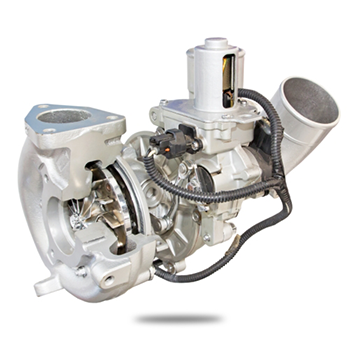12/09/2017 Event
TURBOCHARGER AND LUBRICATION

Lubrication is essential for turbochargers, which rotate at extremely high speeds to boost the engine's power by forcing more air into the combustion chamber.
These high rotation speeds mean equally high operating temperatures and working pressure. Parts that constantly rub against each other can quickly lead to excessive wear and tear and, eventually, turbocharger failure. Lubricating oil does a vital job, cooling the shaft and the bearings and providing the right amount of lubrication to avoid any problems caused by excessive wear.
The oil has a cooling effect as it passes through the turbocharger hoses. It's important to make sure that there is always enough oil to transfer the heat quickly and efficiently from the turbocharger parts to the oil itself. This reduces the temperature and keeps it within the ideal range.
Thanks to this process, the clearance between parts remains the same, because there is no expansion due to heat, which could damage them.
Obviously, the area must be kept clean. This is essential, because any residues that form deposits in the area around the bearings and on the shaft will affect the latter’s balance and quickly lead to wear and failure.
The oil contains detergents and dispersants, whose job is to make sure that the dirt generated during combustion does not build up on the metal surfaces. These additives play an essential role by preventing the formation of deposits that would prevent oil from circulating and thus make it impossible to cool the area properly, causing the temperature to rise.
Similarly, synthetic oils also help keep the area clean. They are excellent at absorbing dirt, making them a useful ally when trying to maintain your turbocharger in good condition to ensure it works as expected. The dirt in the oil is removed by the filters.
All of this helps boost the oil's ability to lubricate moving parts, keeping the turbocharger working efficiently.
The turbocharger intake filter may also be adversely affected by deposits. These reduce the amount of oil that gets through by allowing dirt to build up, effectively cutting off the oil supply to the turbocharger. And if less lubricant reaches the turbocharger, it will be inadequately cooled and lubricated, which can lead to turbocharger failure.
Before this actually happens, you will generally hear a noise — something like a siren — that gets louder and louder if you continue to drive. If you hear this noise, take the car to the auto repair shop to have it checked out.
Take the following steps to avoid problems with your turbocharger:
- Lubricant: Use synthetic products such as SAE 5W-40 or 5W-30 if your vehicle doesn't have a particulate filter. If it does, opt for a compatible 5W-30 or 0W-30 grade.
- Maintenance: Maintenance should follow the severe conditions schedule, which means that the mileage for the oil change must be reduced to ensure that less dirt builds up in the oil. The relevant mileage is given in your owner service manual.
If you follow the oil change instructions to the letter, there is much less likelihood of turbocharger failure. That means less hassle and lower repair costs for car owners.

